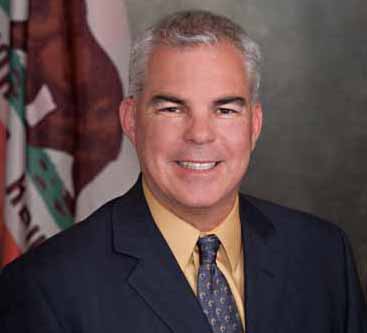
| July 2012 | Past Issues | Printer-Friendly | Advertise | Affiliates Search | Find a Pest Control Operator | PCOC.org |
|
EVP NOTES
As most of you have heard by now, Nancy Buck is retiring as PCOC's Manager of Financial Services on Aug. 31. Nancy has worked for PCOC for 21 years...in fact her first day on the job was Sept. 1, 1991. Exactly 21 years later she is retiring and moving to the Pacific Northwest. We honored Nancy at the Expo Banquet last month. As small business owners, employers and managers, we all know the hugely important value in hiring and keeping good employees. A good employee is worth his/her weight in gold, as the saying goes. Well, PCOC could not have been better served over these many years as it has been by Nancy. She has been a faithful and committed employee who has worked diligently on behalf of all PCOC members. She loves her job and has provided untold services to countless members...because her job does not only entail keeping the books for PCOC and its four subsidiaries. Here are some things you probably don't know about Nancy: She was born and raised in Stockton. Her father was a conductor on the Western Pacific Railroad and her mother was a registered nurse. She moved to Sacramento in 1979 and still lives in the original house she purchased. Between she and Lon, her husband, they have nine children and 19 grandchildren. She currently lives with four Chihuahuas, a cat and two birds. Nancy loves wordcarving...and she is very good: caricatures, animals and chip carving mostly. She is a member of two woodcarving clubs and travels throughout the West with a group of similar enthusiasts. Nancy started riding a scooter at the young age of 57. We bid Nancy a very fond farewell and send her best wishes in her retirement. The PCOC family will miss her but know that she and Lon will have many years ahead together in well-deserved retirement. Well done Nancy! FROM THE DESK OF THE PRESIDENT, SCOTT HOWELL
Over the years, the members of PCOC have together faced and conquered many challenges, including some which have even threatened our industry and our way of life. Through the sheer determination and collective strength of our members, we have welcomed each challenge as an opportunity to build our organization into one that truly represents and works on behalf of all pest control companies, both large and small alike. To achieve all that we have accomplished, there is no greater weapon in our arsenal than the board of directors. One of the first pieces of advice I was given when I was appointed to the executive committee six years ago was from one of our past presidents, Bobby Gordon. Bobby urged me to always remember that PCOC is run by the board of directors. Over the years I have remembered his exhortation that this organization is run, not by the executive committee, not by Martyn or the staff, but by the directors who carry out the wishes and desires of each of the districts they represent. Bobby is right. Without the input from the districts through the voices of their directors at our quarterly meetings, PCOC would become a stale ivory tower institution run by a select few. That is certainly not the vision held by any member I have ever met, whether it be from a past president, or from a brand new member who is engaged at the district level. Our staff at the PCOC office does a fantastic job and the executive committee members put in many extra hours to create an agenda and try to navigate the issues we face, but all of that hard work can only have meaning with input from the directors. It is imperative, then, that we have an effective board of directors and strong committees at the state level to react to the needs of the districts as well as to communicate to them effectively on the issues of the day. It is that combined synergy that makes PCOC the strong and effective organization that it is. But there is a problem. Over the last three years, we have seen on average only about 60 percent of the elected directors attending the quarterly board meetings. I cannot impress upon you more the importance of having all of the directors present so that each district is represented as intended by those who created our bylaws. When a district is not represented by its "full complement" as Ron Suber used to put it, that district runs the risk of having little or no say in the direction and activities of PCOC. It also runs the risk of missing out on vital discussions that produce a wealth of information that the members of their district desperately need. And perhaps most significantly, we as an organization begin to lose the strength that of our collective power to make a difference across California. Something must be done. During my year as president, I am making it my top priority to find out why so many of our districts are under-represented at the board meetings. Right now there are a number discussions about how to "fix" this problem. I am sure you have heard about proposals to reduce the number of directors or to reduce the number of meetings. Perhaps these ideas might seem controversial, but without more input and other creative solutions, we lack the full range of options from which to make the best decision for the direction we are to take. The truth is we cannot solve this problem without input from EVERY district speaking with the voice of ALL of their elected directors. I urge each director to be sure to come to the next meeting on Sept. 29 in Monterey so that we can have a much needed discussion about this matter. Is your district strapped for money? Is your district having a hard time finding volunteers? Are there too many other PCOC commitments that prevent all of the directors from attending all of the functions? Is it the economy? Is there just too little value in our board meetings since they don't last for four or five hours anymore? I ask each of the directors and district chairs to ask these and other questions at your district meetings and bring those answers to the board meeting in Monterey so that we as a group can tackle this issue and resolve it in a way that is amenable to everyone. If you have any ideas you wish to share, please email them to me at showell@missioncity.net. Thank you. LEGISLATIVE UPDATE
IN THE NEWS
 When I first took this position as the Director of Membership and Technical Services, my idea of the industry was very intellectual. I wanted to boost membership through increased benefits, thus creating a product that would sell itself. I also wanted to help the association flourish and help those businesses involved. As I have said these notions were purely intellectual and did not reach to the deeper level of the heart. I thought of it as a job that would be challenging and most likely rewarding as I succeeded in my endeavors. When I first took this position as the Director of Membership and Technical Services, my idea of the industry was very intellectual. I wanted to boost membership through increased benefits, thus creating a product that would sell itself. I also wanted to help the association flourish and help those businesses involved. As I have said these notions were purely intellectual and did not reach to the deeper level of the heart. I thought of it as a job that would be challenging and most likely rewarding as I succeeded in my endeavors.
Not until the PCOC Expo in San Diego in June did the fullness of this job and what the association means go beyond the mind. I have heard several people associate PCOC with family, but the really quantifiable presence of this idea had not taken root. I saw not just pest control business owners, but parents and children. I saw the scholarship committee give away money to help contribute to the education of the children of pest control parents. I saw people who should be business competitors having a wonderful time with one another, breaking bread and drinking, talking and laughing, smiling and dancing (well, the dancing was on the paddle boat after the reception dinner, not at the actual reception). I saw what you might see at a good family reunion. When the new president, Scott Howell, was sworn into office, he gave a moving speech and within that speech he spoke of growing up in the industry and being the next generation of his family to be in the business. He spoke about how PCOC has worked to keep the industry honest because no one company stands alone. If one company uses harmful practices then all suffer. He emphasized that such practices don't just affect that company but the livelihoods of all the industry – owners and employees. I myself am the third generation to be in the industry, and my own family has earned its income from pest control. Even the money that paid for the food on our tables and my college education came from pest control. PCOC is truly a family – many of whom volunteer their time because they see the necessity of helping pest control and in doing so help themselves and their families. They work hard to build their companies, to feed their families and hopefully create a legacy, and they willingly help one another for the betterment of the industry. Now I truly see the importance of PCOC and my job in particular. Membership in the association has been dropping in recent years. Participation has dwindled, and now I commonly hear, "Why should I be a member of PCOC? Why should I stay a member of PCOC? What has PCOC done for me?" These are valid questions, and we may not do enough to disseminate the many legislative issues PCOC has averted that would be detrimental to our industry or some of the benefits like fleet pricing for vehicles through Enterprise or the Peacock Insurance created by PCOs, for PCOs. One great example of averted legislation occurred not too long ago. A certain legislator who has no idea how pest companies work thought it might be a good idea that before a pest company treats a residential home, it must notify 24 hours in advance all properties adjacent to and across the street from that property. Imagine the logistical nightmare such a bill would impose on PCOs – not to mention the time and money wasted. Many companies would simply have to shut down their businesses because they could not deal with the loss in production. Because of the relationships PCOC has developed at the capitol through our annual Leg Day, where representatives of PCOC go to the capitol building and meet with various assemblymen and senators, we were able to speak to this legislator and explain why such a bill would harm all pest control businesses. The assemblyman agreed not to present the bill. Now I'm sure many members do not have this sense of family when they think of PCOC – usually because they are too busy running their own businesses or because they are in a district that is not very active. They may even wonder, "What has PCOC done for me?" Next time think of the above example or the many like it that have been averted and ask, "How would my company have suffered if this or that regulation had been enacted?" New Pyrethroid Regulations The Department of Pesticide Regulation has adopted regulations that govern the non-agricultural outdoor use of all pyrethroid pesticides, which go into effect on July 19th. PCOC's Water Quality Taskforce has worked closely with DPR over the past year on this issue. The regulations closely track the language that is contained on most new pyrethroid products and also contains language that reflects an exchange of letters between EPA and DPR late last year, regarding applications to eaves and vertical surfaces above grade, including pin stream applications. The new pyrethroid labels and regulations are both intended to reduce the runoff into surface water of non-agricultural uses of pyrethroids. A detailed article written especially for the PCOC NewsBriefs will appear next month. A copy of the regulations can be found by clicking here. UPCOMING EVENTS
2012
Sept. 28-29
Board of Directors Meeting
Hyatt Regency
Monterey, CA
Oct. 2
18th Annual Tri-District Golf Tournament
Benefiting PAPCO
Coyote Hills Golf Course
Fullerton, CA
Dec. 7-8
Board of Directors Meeting
Hilton Palm Springs
Palm Springs, CA
2013
March 22-23
Board of Directors Meeting
Grand California Resort
Anaheim, CA
April 23-24
Legislative Days
Hyatt Regency Hotel
Sacramento, CA
May 30-31
Leadership Academy
Catamaran Resort Hotel
San Diego, CA
June 27-29
PCOC Expo 2013
Hyatt Vineyard Creek Hotel
Santa Rosa, CA
Sept. 27-28
Board of Directors Meeting
Catamaran Resort Hotel
San Diego, CA
Dec. 6-7
Board of Directors Meeting
Holiday Inn Golden Gateway Hotel
San Francisco, CA
MEMBER VALUE PROGRAM
PCOC MONTHLY INSURANCE/SAFETY TIP
You consider your company's safety incentive program a harmless and effective way to promote safe behavior among your employees and reduce injuries. But OSHA could see the very same program as unlawful discrimination and a violation of OSHA recordkeeping regulations and whistleblower protections. OSHA regards the ability to report injuries or illnesses without fear of retaliation as "crucial to protecting worker safety and health." Without that right, "Employees do not learn of and correct dangerous conditions that have resulted in injuries, and injured employees may not receive the proper medical attention or the workers' compensation benefits." Earlier this year, OSHA released a memorandum to compliance officers and whistleblower investigative staff that outlined "employer practices that can discourage employee reports of injuries and violate section 11(c), or other whistleblower statutes." According to the memo, certain incentive programs discourage the reporting of injuries and encourage discrimination against workers who report injuries. These include: 1. Taking disciplinary action against all employees who are injured on the job, regardless of circumstances. Reporting an injury is always a protected activity, and OSHA views discipline against an employee who reports an injury as a direct violation of whistleblower statutes. 2. Taking disciplinary action against an employee who violates an employer rule about the time or manner for reporting injuries and illnesses. OSHA recognizes that employers have a legitimate interest in establishing procedures for receiving and responding to reports of injuries. However, such procedures must be reasonable and may not unduly burden the employee's right and ability to report. For example, the rules cannot penalize workers who do not realize immediately that their injuries are serious enough to report, or even that they are injured at all. 3. Disciplining an injured employee because the injury resulted from his/her violation of a safety rule. OSHA encourages legitimate workplace safety rules to eliminate or reduce workplace hazards and prevent injuries. In some cases, however, an employer may use a work rule as a pretext for discrimination against a worker who reports an injury. OSHA will investigate these situations carefully, looking at whether the employer monitors for compliance with the work rule in the absence of injury and whether it consistently disciplines employees who violate the work rule in the absence of an injury. Enforcing a rule more stringently against injured employees than noninjured employees may suggest that the rule is a pretext for discrimination against an injured employee. 4. Creating a program that unintentionally or intentionally incentivizes employees to not report injuries. For example, an employer might enter all employees who have not been injured in the previous year in a drawing to win a prize, or a team of employees might be awarded a bonus if no one from the team is injured over some period of time. Such programs might be well-intentioned efforts to encourage workers to use safe practices. However, there are better ways to encourage safe work practices. Acceptable Safety Incentives A safety incentive program structured to recognize and reward positive behaviors, rather than punishing negative ones, is less likely to draw the wrath of OSHA. Suggestions include: · Offering rewards for suggesting ways to strengthen safety and health · Throwing a recognition party at the successful completion of company-wide safety and health training
For more suggestions on structuring a safety program, please contact the PCOC Insurance Program department of Jenkins Insurance Services at (877) 860-7378. NEW MEMBERS
FREQUENTLY REQUESTED INFORMATION
NPMA LOGIN FOR JOINT MEMBERSHIP LOGIN: 313501 PASSWORD: PCOC PCOC website password for 2012-2013 effective July 1, 2012: "killbugs"
Department of Fish & Game Department of Food & Agriculture Department of Pesticide Regulation Find Your Legislator Healthy Schools Act Structural Pest Control Board |
Pest Control Operators of California |
 |






